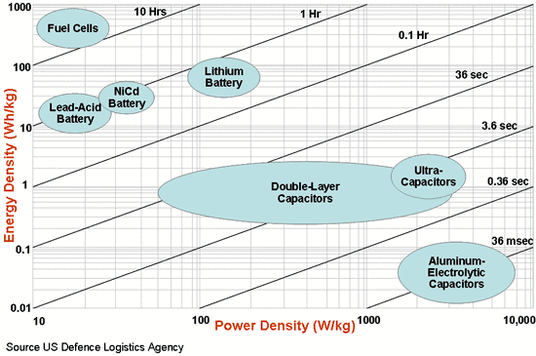- They have high energy density. The energy density of lithium-ion is typically twice that of the standard nickel-cadmium. There is potential for higher energy densities.
- Better weight to energy density ratio. A typical lithium-ion battery can store 150 watt-hours of electricity in 1 kilogram of battery. A lead-acid battery can store only 25 watt-hours per kilogram. It takes 6 kilograms to store the same amount of energy that a 1 kilogram lithium-ion battery can handle.
- Lithium-ion is a low maintenance battery, an advantage that most other chemistries cannot claim. There is no memory and no scheduled cycling is required to prolong the battery's life. In addition, the self-discharge is less than half compared to nickel-cadmium.
- Aging is a concern with most lithium-ion batteries
- Capacity deterioration is noticeable after one year, whether the battery is in use or not.
- A temperature above 35 degrees C affects the battery pack performance instantly and even permanently if it lasts many months. In addition the power of lithium-ion batteries decreases in cold weather.
|
Lithium-Ion - A reasonable compromise
The Ragone chart which is used for performance comparison of various energy storing devices. On such a chart the values of energy density (in Wh/kg) are plotted versus power density (in W/kg). Conceptually, the vertical axis describes how much energy is available, while the horizontal axis shows how quickly that energy can be delivered, otherwise known as power, per unit mass. The sloping lines on the Ragone plots indicate the relative time to get the charge in or out of the device. |
Even though Lithium-Ion batteries offer a good compromise between energy and power, we need to have a battery which can have better energy storage capacity with higher power ratings.
Auto manufacturers lack information as to how batteries age under different user conditions and climates. Nissan Leaf had serious battery degradation issues in hot American states like Arizona. To compensate for capacity loss, EV manufacturers increase the size of the batteries to allow for some degradation within the service life.
For example, our Indian electric car, The Mahindra e2o has a battery pack with 125 km worth of energy inside it. But the models that were sold earlier only provided 100 km worth of energy. The remaining 25 km worth of energy is 'buffer' which is meant to protect the battery pack from allowing users to set a lower maximum state of charge in order to extend battery life.
Nevertheless most EV batteries are guaranteed for 5–8 years or 1,00,000 km and they support more than 2000 charge cycles. Assuming we charge the pack 3 times a week (assuming 2 full cycles), an average EV user will charge around 145 cycles a year. A lithium-ion battery pack will last a long time. There are EV owners who have used a Nissan Leaf for 1,00,000 miles on a single battery pack. There have been Revai owners who have used a single battery pack for more than 6 years. So its important to trust the the lithium-ion chemistry and ensure you follow best practices to take care of it.
- Ensure there is no 'deep discharging' of the batteries. Ensure the state-of-charge is in the range of 40-70 percent of capacity, which is generally the best state of charge to leave a battery before leaving it unused for an extended period of time
- Charge frequently - mostly every 2 days even if the SOC is 60%. Lithium-ion batteries generally last longer when they are “cycled” (charged and discharged) “more shallowly,” rather than fully from 0 to 100 percent charge.
- Once a week, keep the battery pack plugged in for overnight charging (of about 10 hrs) since this enables the Battery Management System (BMS) to check and balance cells that are low on charge in the battery pack, keeping all of them at same level. Remember each battery pack is made out of individual cells and these cells need balancing. By plugging in for 10 hours or so, you will allow the BMS to check every cell to ensure that no cells are out of balance.
- Keep it cool. Every EV owner should do this - park the vehicle in the shade as lithium batteries are sensitive to heat. Forget your ICE car habits and always find a cooler spot to park your car.
Owning an EV is a liberating experience. No oil, No visiting petrol pumps, you are doing good for your country and the environment. But most people are worried bout batteries and the costs of changing the pack.
These simple tips from PluginIndia will ensure you can enjoy a hassle free experience and keep your
battery pack healthy and happy for a long time!

